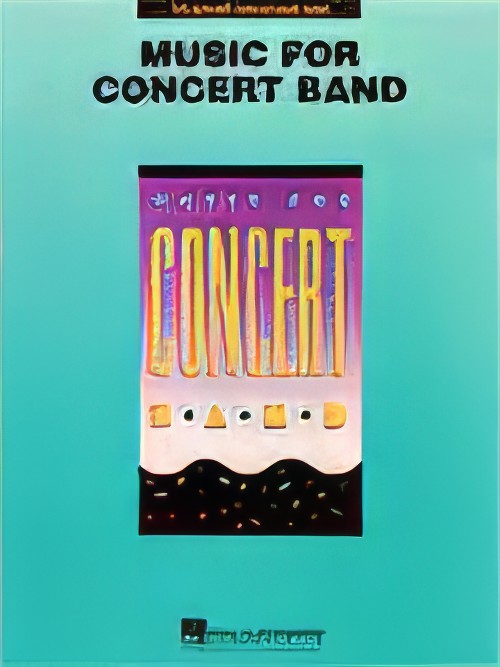Results
-
 £202.99
£202.99El Quijote Wind Band Set (Score & Parts)
El Quijote is based on Cervantes novel Don Quixote. This gem of Spanish literature has captured the whole world, and is widely acclaimed to be not only one of the most influential and emblematic work in the field of Spanish literature, but more generally a founding work of modern Western literature. Ferrer Ferran composed the symphonic fantasy El Quijote on the occasion of the 400th anniversary of this literary work. The composition can be performed with an optional narrator who declaims from Cervantes? work. 16:06
Estimated dispatch 7-14 working days
-
 £154.99
£154.99Evergreen Concerto Wind Band Set (Score & Parts)
This fantastic new work is set to become a classic in the trumpet repertoire. Each of its three contrasting movements can be played alone as shorter pieces or together as a mini concerto. The second movement is particularly interesting in the fact it is a fantasy in theme and variations form, based on a Handel minuet. A must for all trumpet players of an intermediate to advanced level.
Estimated dispatch 7-14 working days
-
 £59.40
£59.40For thy Courts Above
An expressive fantasy based on the hymn, "Come, Thou Fount of Every Blessing". Huckeby's sonorous and richly harmonized setting is an excellent vehicle for expanding your band's ability to perform in a warm legato style while gaining an eloquent program piece. A truly impressive and moving work!
Estimated dispatch 7-14 working days
-
 £109.99
£109.99L?'pez Odero Wind Band Set (Score & Parts)
Lopez Odero is a fantasy written for concert band that incorporates the folk music of the Andalusia people. It features some beautiful songs from the Cadiz province, with their fascinating Flamenco-rhythms. The person who commissioned the work requested it be dedicating it to his father, Lopez Odero, a talented clarinet player, after whom the piece is named. 06:00
Estimated dispatch 7-14 working days
-
 £64.99
£64.99NIGHT BEFORE CHRISTMAS (with narrator) (Concert Band) - Moss, John
John Moss has painted a musical backdrop of fantasy and wonderment for this timeless Christmas poem. This superb program number offers an ideal opportunity to invite a faculty member, mayor, or local personality to be a part of your holiday program.
Estimated dispatch 7-14 working days
-
 £77.22
£77.22Of Time And Change
A beautiful introduction on a well-established hymn instantly identifies this musical fantasy as the perfect choice for a concert or festival performance. Spirited themes lead us to the beauty of a highly expressive middle section. In closing, a driving rendition of the hymn gives way to a joyous ending that is both bold and dramatic. This wonderful composition has been carefully orchestrated to make your group sound its absolute best! Very impressive!
Estimated dispatch 7-14 working days
-
 £159.99
£159.99Pirate's Dream Wind Band Set (Score & Parts)
In this fascinating piece, composer Hayato Hirose creates a fantasy world of a pirate who dreams of sailing to a treasure island. The music follows four different scenes that are played without interruption: I. Introduction and Departure II. Banquet in the Foreign Land III. Longing in the Moonlight IV. Hurricane and Treasure Island This piece is full of drama and adventures and will bring joy and excitement to both performers and audience. 0:12:45
Estimated dispatch 7-14 working days
-
 £159.99
£159.99Prevision (CD incl.) Wind Band Set (Score & Parts)
The work Prevision has been composed in a free fantasy form. Deep in thought the composer sketches his prevision - the development of his small grandson growing up to be an adult. After a brilliant introduction, a slow march follows, which symbolises the first steps toward adulthood. Aspects such as love and a sense of security, that are indispensable for a positive development, are presented in a calm middle section, after which an energetic closing part refers to the rebelliousness of an adolescent. The grand finale of Prevision expresses the grandfather's and composer's positive picture of the future. 0:10:30
Estimated dispatch 7-14 working days
-
 £55.44
£55.44Sweet Land of Liberty
From the breathless introduction to the touching chorale on ``America,'' from the brilliant fanfare to the stirring finale, this patriotic fantasy is truly a memorable salute to the spirit and heritage of our great nation. Expanded from the very popular field version, this powerful, dignified, yet playable setting is sure to evoke the strongest feeling of pride and love of our ``Sweet Land of Liberty.''
Estimated dispatch 7-14 working days
-
 £154.99
£154.99Toyland Suite Wind Band Set (Score & Parts)
Who has not played with toys as a child? While listening to this wonderful suite, your audience will regain their youthful memories by entering a world of fantasy and imagination with each movement representing a different toy. Dolls and Marionettes - the dolls are echoed in a cheerful tempo, and the marionettes in a waltz. The Doll House - slower and more cantabile. The Train - we hear the steam engine, the steam whistle and the buzz of a tour in the world of imagination. The Tin Soldier - we hear footsteps far off, coming closer, the rhythm of the drums, the energetic sound of the army. Dressed in uniforms and in straight lines, they march in a perfect rhythm. Make yourself feel young once again with this great work. 15:30
Estimated dispatch 7-14 working days
